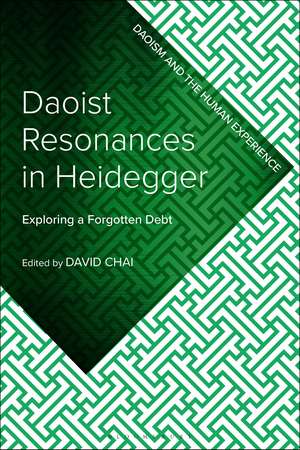Daoist Resonances in Heidegger: Exploring a Forgotten Debt: Daoism and the Human Experience
Editat de David Chaien Limba Engleză Paperback – 27 dec 2023
| Toate formatele și edițiile | Preț | Express |
|---|---|---|
| Paperback (1) | 192.36 lei 6-8 săpt. | |
| Bloomsbury Publishing – 27 dec 2023 | 192.36 lei 6-8 săpt. | |
| Hardback (1) | 540.65 lei 6-8 săpt. | |
| Bloomsbury Publishing – iun 2022 | 540.65 lei 6-8 săpt. |
Preț: 192.36 lei
Preț vechi: 249.92 lei
-23% Nou
Puncte Express: 289
Preț estimativ în valută:
36.81€ • 38.33$ • 31.11£
36.81€ • 38.33$ • 31.11£
Carte tipărită la comandă
Livrare economică 10-24 martie
Preluare comenzi: 021 569.72.76
Specificații
ISBN-13: 9781350203525
ISBN-10: 1350203521
Pagini: 280
Dimensiuni: 156 x 234 x 25 mm
Greutate: 0.39 kg
Editura: Bloomsbury Publishing
Colecția Bloomsbury Academic
Seria Daoism and the Human Experience
Locul publicării:London, United Kingdom
ISBN-10: 1350203521
Pagini: 280
Dimensiuni: 156 x 234 x 25 mm
Greutate: 0.39 kg
Editura: Bloomsbury Publishing
Colecția Bloomsbury Academic
Seria Daoism and the Human Experience
Locul publicării:London, United Kingdom
Caracteristici
Covers a range of themes including the environment, language, death, temporality, aesthetics, and race from the groundlessness of non-being
Notă biografică
David Chai is Associate Professor in the Philosophy Department at the Chinese University of Hong Kong, Hong Kong.
Cuprins
IntroductionPart 1: Revisiting Heidegger and Daoism1. Thoughts on the Way: Being and Time via Laozi and Zhuangzi, Graham Parkes (University of Vienna, Austria)2. Heidegger's Daoist Phenomenology, Jay Goulding (York University, Canada)3. The Simple Onefold of Dao and Being: Reading Laozi, Zhuangzi, and Heidegger in Light of Interality, Geling Shang (Grand Valley State University, USA)Part 2: Existence and the Arts4. Dao of Death, Jason M. Wirth (Seattle University, USA)5. Thing and World in Laozi and Heidegger, Eric S. Nelson (Hong Kong University of Science and Technology, Hong Kong)6. Zhuangzi, Heidegger, and the Self-Revealing Being of Sculpture, David Chai (Chinese University of Hong Kong, Hong Kong)Part 3: Language and Identity7. Rivers to the East: Heidegger's Lectures on Hölderlin as Prolegomena for Daoist Engagements, Daniel Fried (University of Alberta, Canada)8. Thinking Through Silence: (Non-) Language in Heidegger and Classical Daoism, Steven Burik (Singapore Management University, Singapore)9. The Politics of Uselessness: On Heidegger's Reading of the Zhuangzi, Fabian Heubel (Institute of Chinese Literature and Philosophy, Academia Sinica, Taiwan)10. "We have been Schooled by the Cabin haven't We?" Heidegger and Daoism in the Provinces, Mario Wenning (Loyola University Andalusia, Spain) Index
Recenzii
There were three legendary philosophical meetings with Laozi in history. The first one was the meeting of Confucius with Laozi. The second was that of Buddha with Laozi, while the third one and the latest one should be that of Heidegger with Laozi and Daoism. Papers collected here in this book are devoted to an in-depth discussion of Heidegger's relationship with Laozi and philosophical Daoism. It is another significant step toward a thoughtful dialogue between the two great cultural traditions in the west and east after the publication of Graham Parkes's book "Heidegger and Asian Thought" more than 30 years ago. Important themes such as "thing," "language," "death," "identity" "art," "interality," and "nationhood" etc. are explored and discussed from a comparative perspective. They will stimulate readers to deep and to further their understanding of both Heidegger and Daoism.
The time is ripe for Daoist Resonances in Heidegger. The chapters in this book are profound explorations of the explicit and implicit connections between Heidegger's thought and the two foundational texts of the Daoist tradition-connections that are replete with vital contributions to our still dawning age of cross-cultural philosophy.
The time is ripe for Daoist Resonances in Heidegger. The chapters in this book are profound explorations of the explicit and implicit connections between Heidegger's thought and the two foundational texts of the Daoist tradition-connections that are replete with vital contributions to our still dawning age of cross-cultural philosophy.


